AC Capacitor Replacement: Costs, Tips, and Tricks You Need to Know (Guide)
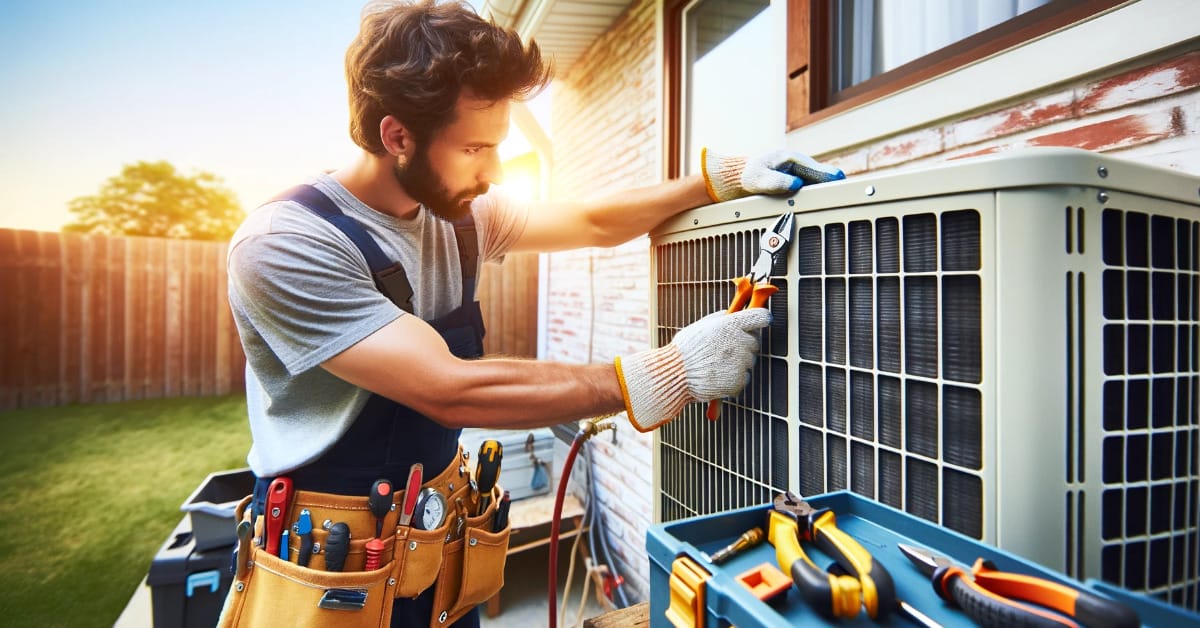
Alright, folks, let’s get into the nuts and bolts of keeping cool. We’re talking about that little hero in your AC unit – the capacitor. It might be small, but when it goes, you’ll notice.
AC capacitor failure can lead to a warm house and a thin wallet. Replacing it is a cool decision that ranges from $9 to $45 for DIYers or $150 to $400 for professional peace of mind.
So, grab your toolbox, and let’s dive into the world of AC capacitors and find out how much you’ll be shelling out to chill out.
Factors in Calculating AC Capacitor Cost
When replacing an AC capacitor, the cost can vary depending on several factors. The type of AC unit, cost of labor, and even geographic location can all play a role in determining the final price.
Here are some key factors to consider when calculating the cost of an AC capacitor replacement.
AC Unit Type

The type of AC unit you have can significantly impact the cost of replacing the capacitor. Different brands and manufacturers may have specific capacitor requirements, and larger units will require larger capacitors, which can come with a higher price tag.
Additionally, outdated models may require harder-to-find parts, which can drive up the replacement cost. Units with easy-to-access capacitors will typically require less labor and, therefore, be less expensive to replace.
Labor
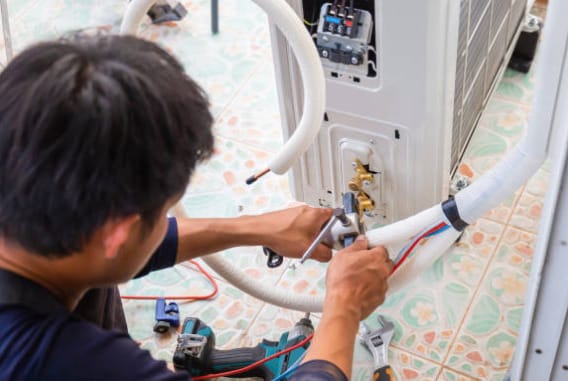
Labor costs are a significant factor in the overall cost of replacing an AC capacitor. While the part may be relatively affordable, the knowledge and skill required to complete the job safely means that contractors can charge a higher labor fee.
Homeowners should expect to pay for the expertise required to complete the job correctly and safely. While it may seem like a large expense, the peace of mind with a well-done job can be worth the added cost.
Geographic Location

The geographic location of your home can also impact the cost of replacing an AC capacitor. HVAC contractors may charge more for their services in highly populated areas with a higher cost of living.
On the other hand, in more rural areas, labor costs may be lower. It’s important to remember that local averages differ from national averages, so getting an estimate from a local contractor is always a good idea.
Additional Costs and Considerations
A few additional factors can impact the cost when replacing an AC capacitor. Let’s take a closer look at some of these considerations.
Replacement vs. Repair
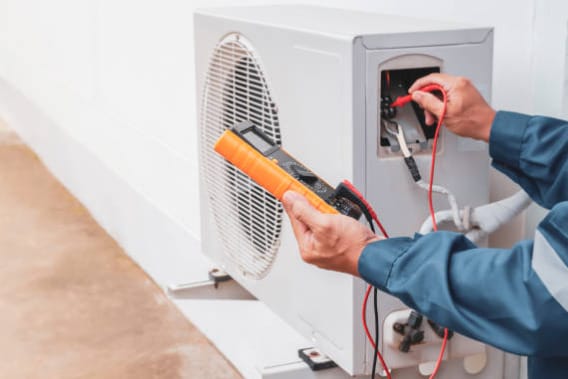
The decision to repair or replace an AC capacitor depends on the state of the capacitor. In some cases, replacing the capacitor may make more financial sense, especially if other components within the unit are starting to break down.
However, if the rest of the unit is in good condition, it may be more affordable to repair the capacitor than replace the entire unit.
Warranty Coverage

Warranties can affect the cost of an AC capacitor replacement. While a capacitor is affordable, a warranty or guarantee from a service provider can provide real value and peace of mind.
Homeowners should also check whether the AC unit is covered by a manufacturer’s or a home warranty, which may reduce the replacement cost.
Season

The time of year can also impact the cost of an AC capacitor replacement. During the summer, when the weather is hotter and more homeowners use their AC units, HVAC companies are in high demand.
This can lead to premium pricing for both maintenance and repairs. It’s important to have an AC unit checked before demand increases to catch problems early and potentially reduce replacement costs if repairs are necessary.
Additional Repairs
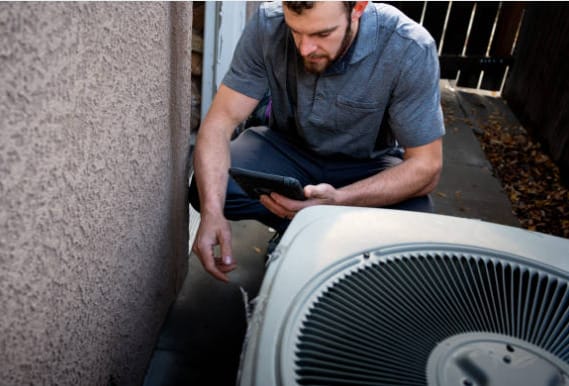
Delaying the replacement of a failing AC capacitor can cause other parts within the unit to begin to fail, leading to additional repairs and a higher price tag.
It’s important to have annual HVAC maintenance checks to catch signs of a failing capacitor early. This can reduce the likelihood of additional repairs and potentially save homeowners money in the long run.
In some cases, additional repairs may be necessary if the capacitor has been left to fail for an extended period of time. For example, a damaged AC compressor can cost as much as $2,800 to replace, while a gas leak can run as much as $1,500 to repair. Thermostat replacements can cost as much as $250, while a fan coil can cost an astounding $2,000.
Types of AC Capacitors
Regarding AC units, different types of capacitors help keep the unit running smoothly. Understanding the difference between these capacitors is essential when it comes time to replace them.
Let’s take a closer look at the specifics of each capacitor type.
Run Capacitor
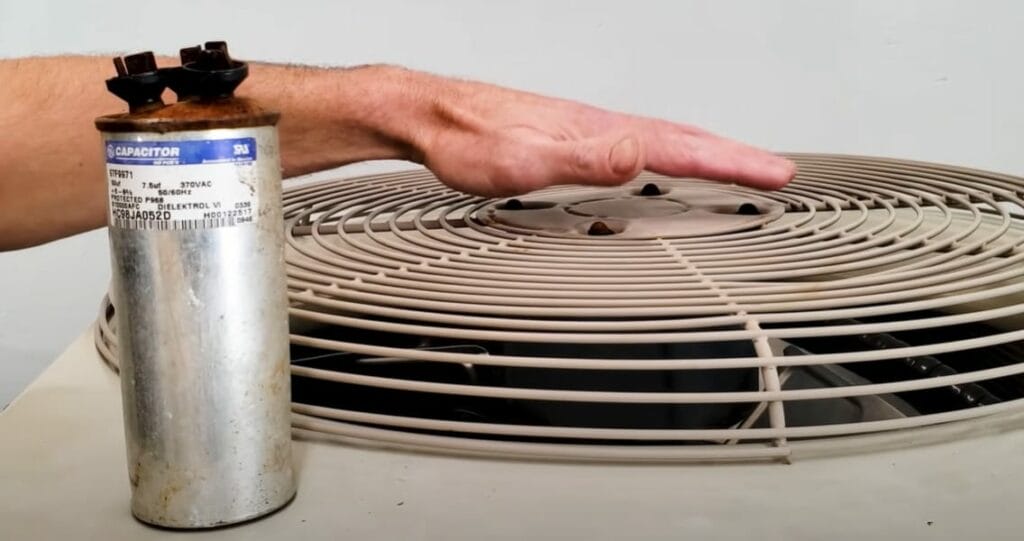
A run capacitor is responsible for powering the unit for the entire duration of the cooling cycle. This type of capacitor is found in most modern homes and is also used when older homes have central air conditioning installed for the first time.
Single-stage capacitors have two terminals and are designed to power a single motor. They are also the most affordable capacitor, costing between $8 and $30. However, a single-stage run capacitor may not be enough for larger homes or oversized AC units to power the unit correctly.
Dual-Run Capacitor
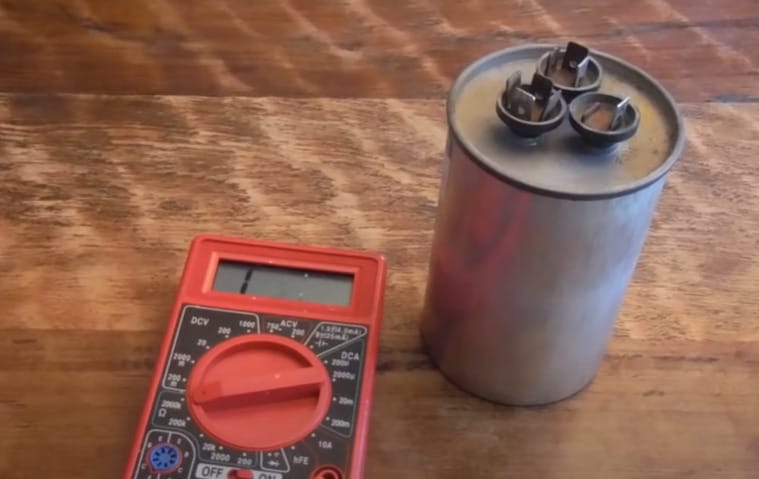
Dual-run capacitors are ideal for larger HVAC systems. With three terminals, they are capable of powering two electrical motors.
Due to their larger size and power, they also come with a higher price tag. Homeowners can expect to pay between $15 and $45 when replacing a dual-run capacitor.
Start Capacitor
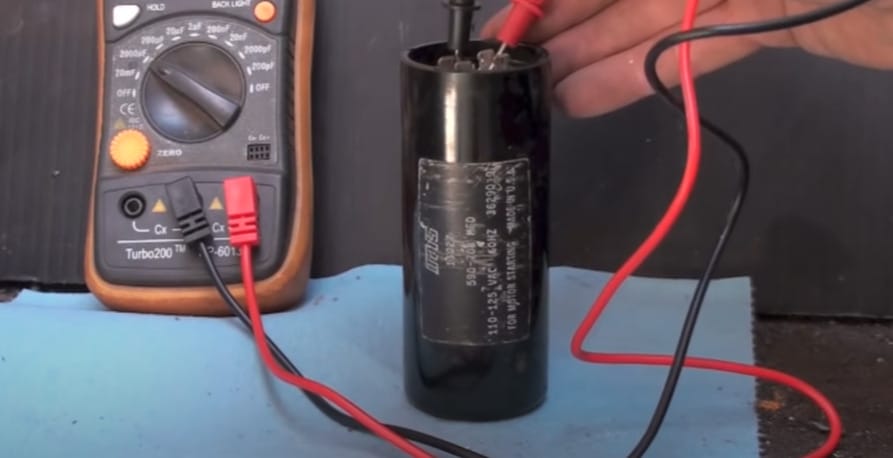
A start capacitor stores energy until a cooling cycle begins. A home’s electrical system may not always provide enough electricity to power up an AC unit.
Hence, a start capacitor provides the extra energy to jump-start the motor. Replacing this common AC capacitor typically costs between $9 and $25.
Blower Capacitor

Furnaces have blower motors that direct hot air throughout a home’s duct system. They also require a capacitor to operate efficiently. The same motor also pushes cool air from the AC unit throughout a home.
This means a blower capacitor works year-round and may wear down faster than other capacitors. A faulty blower capacitor could be the issue if an AC unit’s fan isn’t working—a new blower capacitor costs between $9 and $12, plus labor to replace.
Do I Need to Replace My AC Capacitor?
As a homeowner, it’s important to monitor your AC unit and be aware of any signs that it may need a new capacitor. Here are some common indicators that it’s time to replace your AC capacitor:
- Clicking or Humming Noise. If you hear a clicking or humming noise from your AC unit, it could be a sign that your capacitor is struggling to do its job. While these noises could also be caused by other components breaking down, having an HVAC professional diagnose the problem is best.
- Burning Smell or Smoke. A burning smell or smoke from your AC unit is a warning sign that something is wrong. This could indicate that the coated wires within the unit are being overcome with heat, which could lead to a fire hazard. If you notice a burning smell or smoke, call 911 immediately.
- It is blowing Warm Air. If your AC unit only blows warm air instead of cool air, it could be a sign that your capacitor is failing. This is especially noticeable on hotter days when a properly functioning AC unit might struggle to keep a home cool. If this happens, call an HVAC professional as soon as possible to avoid discomfort and potential danger.
- Difficulty Starting. An AC unit that struggles to start could indicate that the capacitor is failing. If it seems like the unit is attempting to start but can’t leave the starting line, it’s best to work with a professional to diagnose the problem.
- Increased Energy Bills. If you notice a significant increase in your energy bills, it could be a sign that your capacitor is struggling to hold its charge. This means it constantly produces more energy to store, which can lead to a higher electricity bill. If you’re concerned about your energy usage, contact your electric company for a daily breakdown of your kilowatt usage.
- Bulging Appearance. If your capacitor has a bulging appearance, it’s a sign that it’s past the point of repair and will likely need to be fully replaced. Capacitors are normally sleek and cylinder-shaped, so a bulging appearance indicates something is wrong.
Observing these signs can help you catch problems with your AC capacitor before they become more serious. If you notice any of these indicators, working with an HVAC professional to diagnose and fix the problem is best.
AC Capacitor Replacement: DIY vs. Hiring a Professional
When replacing an AC capacitor, homeowners have two options: DIY or hiring a professional HVAC contractor. While DIY may seem more affordable, it comes with risks and potential dangers.
Before you roll up those sleeves or pick up the phone, let’s weigh out the costs and perks of each path. So, let’s dive into this table and find out whether you should channel your inner handyman or play it cool and call in the cavalry.
How to Save Money on AC Capacitor Replacement Cost
As a homeowner, there are several ways to save money on AC capacitor replacement costs. Here are some tips to help you cut expenses and keep your HVAC system running smoothly.
- Sign up for financing rather than paying credit card interest. If replacing an AC capacitor is too much to handle in one payment, consider looking for financing options your contractor offers. By choosing an interest-free or low-interest payment plan over a high-interest credit card, you can save money while building a healthy financial relationship with a local HVAC contractor.
- Perform proper maintenance and cleaning. While proper maintenance and cleaning cannot prevent a capacitor from failing, it can slow the aging process. Routine maintenance can help catch a failing capacitor before it causes a negative domino effect of failing components within the unit. This saves you money and ensures that your AC unit is running efficiently.
- Know the signs of a failing capacitor and catch the problem early. Recognizing the signs and symptoms of a failing AC capacitor is essential. This will not only keep you safe but can also help save you money. The earlier the problem is discovered, the less it can cost to fix.
- Look for deals and rebates. Homeowners can look for rebates from part manufacturers or deals from local stores. They can also ask if an HVAC contractor can provide a discount if they have more than one service performed. This can help you save money on the initial cost of your AC capacitor.
- Shop around for parts. Homeowners can purchase a new AC capacitor through their HVAC contractor, on their own through a big-box store, or directly from the manufacturer. By taking the time to shop around, homeowners can save on the initial cost of their AC capacitor. However, remember that most of the cost of replacing an AC capacitor comes from labor, not the part itself, so spending a lot of time shopping for the cheapest AC capacitor isn’t necessary.
- Get quotes from more than one professional. Hourly labor and job fees vary by contractor. Gathering multiple quotes will ensure that you get the best value and the experience a professional provides. Some contractors may underestimate the complexity of a job and undercharge, while more experienced contractors charge more for their experience.
Frequently Asked Questions
- What Should I Do Before Attempting a DIY Replacement?
- Gear up with safety goggles and gloves, and don’t forget to shut off the power. If you’re not sure about any step, it’s time to dial a technician.
- How Long Does an AC Capacitor Last?
- Typically, a capacitor can last up to 20 years, but it’s common to see them call it quits around the 5 to 10-year mark.
- What If My AC Is Still Not Working After Replacing the Capacitor?
- Then, you might be dealing with a different issue. It is best to call a certified tech to take a look and diagnose the problem.
- Will Any Capacitor Work as Long as the Size Is the Same?
- Not quite. Size isn’t everything. The ratings need to match, too. Think of it as a puzzle piece that needs to fit just right.
- If I Hire a Pro, How Long Will the Replacement Take?
- It’s a quick fix in skilled hands—often done in less than an hour—just enough time for a coffee and a chat about the weather.
- Is There a Best Time of Year to Replace My Capacitor?
- Spring into action before the summer rush. You’ll beat the heat and might even snag an off-season deal.
References
Organizations:
- Air Conditioning Contractors of America (ACCA). https://www.acca.org/
- The U.S. Department of Energy’s ENERGY STAR program. https://www.energystar.gov/
Books:
- “Refrigeration and Air Conditioning Technology” by Bill Whitman, Bill Johnson, John Tomczyk, and Eugene Silberstein. https://books.google.com/books/about/Refrigeration_and_Air_Conditioning_Techn.html?id=wrwaCgAAQBAJ
- “Modern Refrigeration and Air Conditioning” by Andrew D. Althouse, Carl H. Turnquist, and Alfred F. Bracciano. https://www.thriftbooks.com/w/modern-refrigeration-and-air-conditioning_andrew-d-althouse_carl-h-turnquist/247294/
Website Resources:
- Grainger. https://www.grainger.com/
- SupplyHouse. https://www.supplyhouse.com/
- Home Depot. https://www.homedepot.com/
- Lowe’s. https://www.lowes.com/
Video References:
AC Service Tech LLC
Dan the Fix it Man
grayfurnaceman
DIY with Michael Borders
